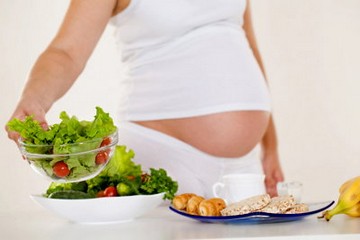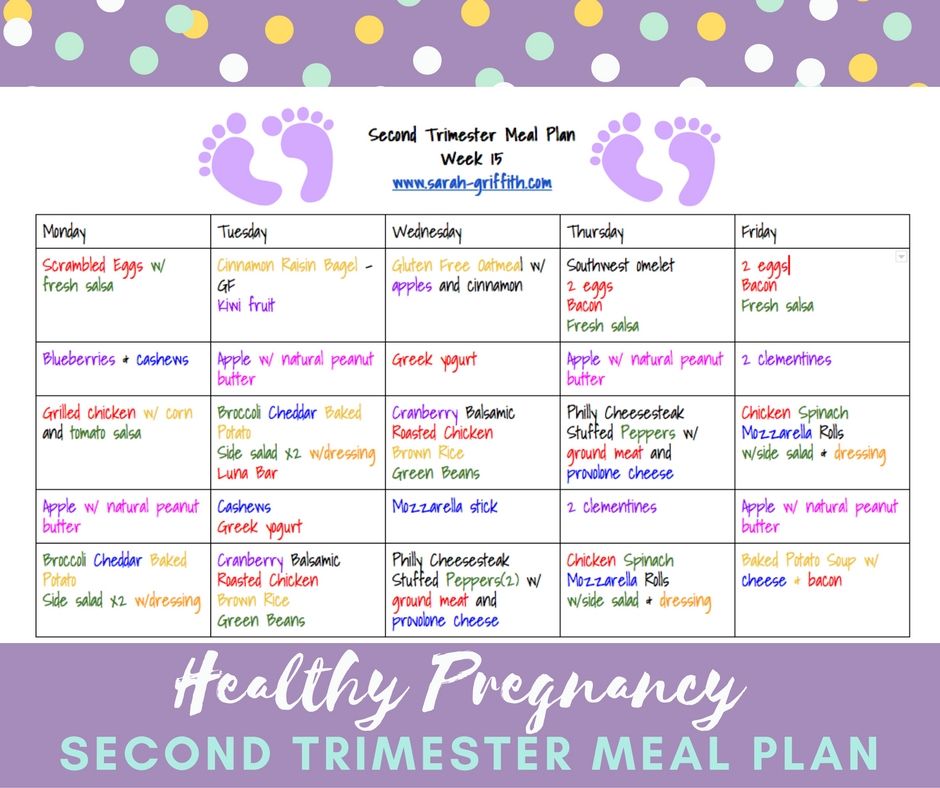Meal Planning During Pregnancy

Contents:
- Diet of Pregnant Women: 1 Trimester
- Diet of Pregnant Women: 2-3 Trimester
- Correct Diet of Pregnant Women: Regime
- Diet of Pregnant Women: Safety Rules
Diet of Pregnant Women: 1 Trimester
At the first months of pregnancy it is no need to change your eating habits drastically especially when that is so difficult to overcome various preferences in meals during this period. Therefore if you’d like to eat some fried potato as before, do it without the slightest scruple.
By the way, several words about preferences in elaborate food. Experts consider that thus the organism of a pregnant woman signals about shortage of certain useful substances. For example, interest in milk-based food indicates of a lack of calcium in organism and if a woman has suddenly wanted some sea cabbage, then the organism needs iodine. Fresh vegetables and fruits, potatoes and salted cucumbers would become a source of vitamin C; nuts, young peas, fish are a source of vitamin B1, bananas contain vitamin B6 and potassium, orange and red vegetables or fruits are rich with vitamin A (that is carotene).
It happens that at the very beginning of pregnancy period some of future mothers refrain from truly useful foods such, for example, as meat, because they just could not stomach it. These changes are connected with early toxicosis, and, usually, pass in time.
Don't force yourself to eat if you don’t want, consult the doctor about it. There are special products for pregnant women available at a store. Such as "Nutridrink", Nutricia; "Femilak", Nutritek; "Enfamam", Mead Johnson. Basically, these are proteinaceous complexes of proteins, vitamins and minerals, which will help to cope with micronutrient deficiency.
These complexes will supply your body with the guaranteed amount of vitamins, calories, proteins and will relieve you of the need to do extra work in preparing food based on bringing in new useful but tasty substances into the organism.
Diet of Pregnant Women: 2-3 Trimester
Since the second half of pregnancy period, the future mother must be very serious about her daily diet. And some useful restrictions in food would even be desired now as the gastrointestinal tract of a pregnant woman begins to function in the overload mode. There could be heartburn and constipation.
The stewed, baked, or steamed food helps to cope with these problems. By the way, roast and fried food causes thirst, and it is necessary to remember that excess of the liquid during pregnancy can in turn cause edemas. Therefore throw aside everything subsidiary and unnecessary.
For the same reason also avoid foods containing high concentrations of salt. But you may add some salt in your meal as usual (and it is better to use iodinated salt), but exclude pickles, salty fish and smoked foods from your menu. The problem is that a large amount of salt in food causes thirst, and too much liquid drunk increases risk of emergence of swellings.
At the last two months of pregnancy the doctors recommend to future mothers to use salt for eating less than usually and not to drink more than 1 or 1,2 litres of any liquid a day. At the same time you shouldn't refrain from the salt absolutely, because this could result in dehydration.
From the first days of pregnancy period try to have coffee without caffeine. This relieves your organism which begins to work under increased loads but you shouldn't have been unaccustomed to your favourite taste. It will also help you to avoid many problems. Thus, exciting effect of coffee can cause contractions of smooth muscles of uterus where the child develops and there may be even a danger of pregnancy termination.
Those of women who worry about grace of their figures need to remember that the habitual low-calorie foods ought to be replaced with foods of standard fat content now. And it is important to add meat, fish, grain, bread to vegetable and fruit diet.
Correct Diet of Pregnant Women: Regime

- To feel good, try to eat each 4 hours.
- Begin your day with a full-fledged breakfast (any milk dish, a little bread from whole grain or muesli and fresh fruits).
- Arrange yourself the real lunch (if you can't afford it, eat a sandwich with fresh vegetables and fruits or the salad filled with soy or corn oil, yogurt and some fruit).
- Have supper easily (the fourth meal has to be dietary: dairy dish, some fruit, a little black bread or unsweetened cookies).
- Between breakfast and lunch and during an afternoon snack it is possible to have a bite slightly: a few fruit, low-fat sandwich, yogurt and some juice. It is better to forget about rich and puff rolls, pizza, baloney, sausages, fat and fried foods.
Diet of Pregnant Women: Safety Rules
As long as you follow the rules of hygiene, you protect yourself from food poisonings. According to basic hygiene practices it is necessary to store products in the refrigerator, to wash vegetables and fruits, not to eat badly fried, thoroughly or half-cooked food, crude eggs, products with overdue expiry terms. Besides such commonly accepted advice there are some more important and some recommendations which are not too obvious.
- Some cheese. Be always disposed to give your preference to cheese on the basis of pasteurized milk, to firm or fused cheese. It is better to cut off a crust from cheese.
- Don't buy any foods cut up into pieces (or by weight), prefer standard vacuum packaging.
- Seafood, crude fish dishes it is possible to eat only if you are sure of their quality.
- At least once a week thoroughly clean up your refrigerator by hot water.
- Meat and fish need to be subjected to hot processing, it is good to warm, but not to boil ready dishes. Them must be stored in the refrigerator no more than 24 hours.
- Don't drink raw milk: all dairy products have to be pasteurized or sterilized.
- Eat a meal with liver about once a week, not more. Remember that liver is a sort of body biochemical laboratory where clearance operations are conducted. So, processing waste substances, those harmful toxins are mainly deposited in liver tissues.
- Use an isothermal packaging for any transportation of your frozen foods. Defreeze frozen products in the refrigerator and never freeze again.
- Store vegetables, meat and the prepared dishes separately.
- Make sure you wash up your hands carefully when after cutting of raw meat or fish you need to cut some salad. For different products use different knives and chopping boards.